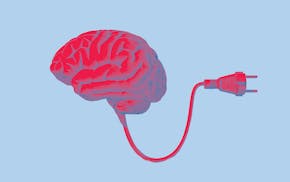A few days into last week's Republican National Convention, the southern Minnesota chief of my consulting circle weighed in. The southern chief is one of the bellwether sources helping me stay in touch with a part of the American political spectrum with which I don't have a natural affinity.
Some verdicts: Donald Trump Jr. is an impressive young man, and Ben Carson is an intelligent gentleman who did his research and made some interesting connections between Hillary Clinton and the devil. (Ted Cruz, however, is embarrassing.)
So I asked the southern chief an important question: Are you fixing to vote for Donald Trump?
The answer: "Still listening, searching, reading and studying everything." That's a change from when the chief wasn't sure about voting at all.
This is important, I think. For the chief, a Christian conservative, there's never a real prospect of voting Democratic. But the idea of a President Hillary Clinton — "ol' Hillary," in the parlance — is the sort of thing that could compel a person to their polling place in a blinding blizzard, shoveling step by step if need be, in order to fill in the opposing oval, if only the name next to it weren't "ol' Trump."
While I was busy thinking that the strategists behind last week's Trump National Convention should have made at least a few polite nods to the broader electorate, they were perhaps drawing in voters like the chief — otherwise reliable Republicans put off by Trump whose inclination thus far has been to stay home in November.
An article from the Economist, reprinted in the Star Tribune's Opinion Exchange section last weekend, noted that the betting markets were giving Trump the same dismal chance of winning in November as they had given "Brexit" of getting the thumbs-up in June. A headline last week at the data-driven site FiveThirtyEight noted that Clinton's lead is as safe as John Kerry's was in 2004.
As social-media combatants like to say when things are beginning to look worrisome: Ruh-roh.
For my purposes, the election could just as well have been held a year ago. That's when I concluded that Clinton would be the Democratic nominee and that my vote would be hers to lose.
Why Clinton, given all we know about her?
Well, why not, since we know what we'll be getting? I won't belabor the intractable pros and cons everybody's already heard. Instead — for the perhaps 0.4 percent who might still be swayed — I'll make a few comparisons.
I've been going around saying (to mostly puzzled looks) that, given the chance, Clinton could be an iteration of Margaret Thatcher. Recall, Thatcher was polarizing in her three terms as Britain's prime minister, but she had a clear conservative agenda and was unyielding in realizing it. If one believes, on the other hand, that the government actually can be here to help and that at least one chamber of Congress will remain in counterbalancing Republican hands, one could do worse than electing Clinton, a former senator with a self-possession similar to Thatcher's but a reputation, as a senator, of partnering even with her fiercest foes.
More important for Americans, Thatcher became President Ronald Reagan's steely partner in defiance of the Soviet Union, the foreign adversary of that time. Foreign policy will be a particularly big deal in our coming election. If President George W. Bush can be seen as a swagger too far and President Obama as Nero fiddling with his drones — neither characterization fair, but both perceived — then Clinton could be seen as a happy medium. As secretary of state, she was a proponent of earlier, more aggressive action in Syria. She was also a driving force behind the intervention in Libya, and although that effort notoriously lacked follow-through, the show wasn't hers alone.
We haven't yet seen Clinton in the role of ultimate decider. Let that intrigue or frighten you as it may; but if you think, as I do, that cloudy with a chance of world war is the unfortunate scenario before us, then you could do worse than having a commander in chief who can be hawkish and diplomatic as the case may be. A lot worse.
But isn't she crooked? Trump would certainly have you think so. Many people don't need persuading on the matter.
What's apparent to me is that while there's a list of Clinton operations that have tested the edges of propriety, typically, it has been the scandal that's the scandal, elevated by opponents and fed by a stubborn defensiveness in response. There will be misjudgments during a Clinton administration, and they likely will play out this same way.
Accept this, and in exchange you get a president deeply versed in public policy. In that sense, one might consider Clinton to share both the positive and negative tendencies of Richard Nixon. Indeed, I've also been going around telling people that Clinton is Nixonian, which, if you've never tried it, is a fun word to elocute.
It's not as bad as it sounds, for (Watergate notwithstanding) Nixon racked up a considerable list of achievements, many transcending ideology. Trump, of course, could also be said to possess Nixonian tendencies — just not the keepers.
Of course, Ben Carson has now pointed to a potential third leg of the Clinton stool — the Luciferian one. (Specifically, that Clinton wrote an academic paper about Saul Alinsky, whose book "Rules For Radicals" touched on the story of Satan.) It's hard to take this seriously, so I'll just point out that a TV show called "Lucifer" premiered last winter. The title character is quite charming. The way I see it: Clinton is not a dynamic public speaker. If the devil can help, then what the hell.
So, barring an extraordinary development, it's settled for me. This fall, I'll be voting for Hillary Thatcher Nixon Lucifer Rodham Clinton. She's complicated, but she's got potential — and that's all a presidential candidate really ever has.
David Banks is at David.Banks@startribune.com.

Rash: Tariffs and reckless rhetoric repel international tourists from U.S. travel
Counterpoint: Sale of Allete/Minnesota Power is in the public interest
Readers Write: Ukraine "peace plan," trans rights

![Josie Johnson for editorial Sunday August piece on 50th anniversary of the March on Washington. Photographed on 7/23/13.] Bruce Bisping/Star Tribune b](https://arc.stimg.co/startribunemedia/QX3FKUHM3EMBYEDDP2Y2SHGTJU.jpg?w=600&h=600&auto=format%2Ccompress&cs=tinysrgb)